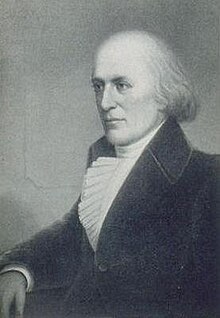Francis Dana
Francis Dana (born June 13, 1743 in Charlestown , Province of Massachusetts Bay , † April 25, 1811 in Cambridge , Massachusetts ) was an American lawyer and politician .
Career
Francis Dana graduated from Harvard College in 1762 . He studied law , was admitted to the bar, and then began practicing in Boston in 1767 . Dana was also politically active. In 1774 he was a delegate to the Provincial Congress. He then spent two years in England , where he tried to settle the differences between Great Britain and the American colonies . After his return he was active as a State Councilor between 1776 and 1780 . He was also a member of the Continental Congress between 1777 and 1778 and signed the Articles of Confederation on July 9, 1778 in this capacity .
On September 28, 1779 he was chosen to accompany John Adams to Paris , who was to negotiate a peace treaty with Great Britain and a trade treaty with Holland there as a commissioner . On December 19, 1780 he was appointed envoy to Russia ; however, he never served there. Dana was again a delegate to the Continental Congress in 1784. He was then a judge on the Supreme Court of Massachusetts between 1785 and 1791 . On November 29, 1791 he was appointed as the successor to Nathaniel Peaslee Sargent as Chief Justice and held this position for 15 years. During this time he took part in the Constituent Assembly in 1788 , which passed the US Constitution . He was also one of the founders of the American Academy of Arts and Sciences in 1780 .
Dana died in Cambridge in 1811 and was buried in Old Cambridge Cemetery .
Web links
- Francis Dana in the Biographical Directory of the United States Congress (English)
- Francis Dana in the database of Find a Grave (English)
| personal data | |
|---|---|
| SURNAME | Dana, Francis |
| BRIEF DESCRIPTION | American lawyer and politician |
| DATE OF BIRTH | June 13, 1743 |
| PLACE OF BIRTH | Charlestown , Massachusetts |
| DATE OF DEATH | April 25, 1811 |
| Place of death | Cambridge , Massachusetts |
